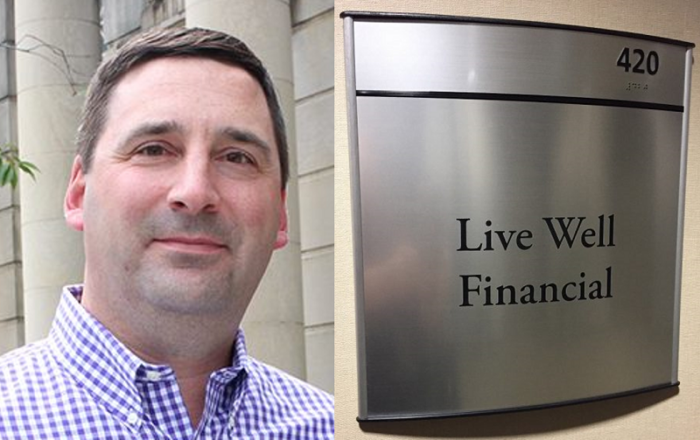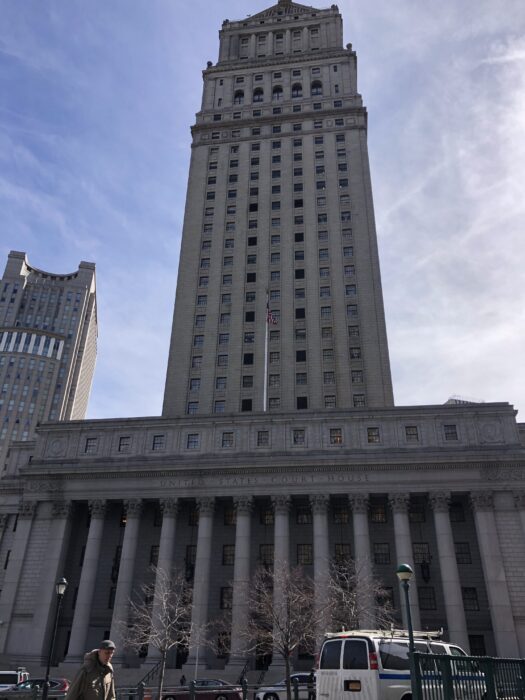Prosecutors are striking back at Michael Hild’s latest attempt to overturn his federal fraud conviction, arguing the embattled local businessman does not deserve a do-over on charges related to the downfall of his former company Live Well Financial.
The response from the U.S. Attorney’s Office follows a filing from Hild last month, in which he called for a new trial based on what he claims is newly discovered evidence in his case.
The former Live Well CEO and Southside real estate developer was found guilty by a jury in 2021 for his role in a reverse mortgage bond pricing scheme that defrauded multiple lenders and helped topple the Chesterfield-based lender. He was sentenced by a federal judge in January to 44 months in prison, a sentence that remains pending while he appeals the verdict.
His latest attempt for a new trial is being made despite that ongoing appeal and despite having been denied a new trial request last year when he sought to blame his previous attorney for sloppy representation.
His new request seeks to blame Live Well’s former lenders, which are the victims in his criminal case. It hinges on financial figures that have come to light during recent arguments over how much in restitution Hild should pay those victims.
The lenders – Mirae Asset Securities, Industrial and Commercial Bank of China, Flagstar Bank and Customers Bank – are the same lenders that forced Live Well into bankruptcy in 2019 and helped spark the federal government’s indictment of Hild and two other former Live Well executives. They were charged with intentionally inflating the value of the company’s bond portfolio and lying to the lenders about those values when taking out tens of millions of dollars in loans.
As Hild’s legal team in recent months had been sparring with the U.S. Attorney’s Office over the amount of restitution owed, the lenders were required to submit additional documentation of the damages they suffered as a result of the Live Well saga.
The documents, Hild’s attorney claimed last month, show that the lenders had since pocketed tens of millions of dollars by holding onto the reverse mortgage bonds after foreclosing on them and reaping interest through so-called coupon payments. Hild claims those payments were unknown to his defense team during the trial three years ago and may contradict the testimony of the lender representatives at trial.
In calling for a new trial, Hild’s attorney argues that the existence of those payments proves what Hild argued at trial: that he had no intent to defraud the lenders in part because he thought the lenders were able to benefit and be made whole from the interest payments in the event of a default.
But in its June 16 response, the U.S. Attorney’s Office argues otherwise.
“Over two years after the jury convicted him of multiple fraud offenses, and after having tried and failed to obtain a new trial based on fundamentally the same argument once before, Michael Hild asks this court yet again to revisit his baseless claim that had the lenders held the bonds that he mismarked to maturity, they would have suffered no loss and that this somehow makes him innocent of the counts of conviction,” the prosecutors wrote to Judge Ronnie Abrams.
The USAO doesn’t deny that the lenders may have recouped millions from the bonds after Live Well’s default, but it does argue that the disclosure of those payments should not be considered new evidence.
“The evidence in question – information regarding the coupon payments obtained by the lender-victims when they were left holding the bonds (and the bag) after his fraudulent scheme unraveled – is not newly discovered, is cumulative of other evidence that was presented at trial, and would not have affected the jury’s verdict.
“What Hild characterizes as a revelation was in fact fully explored at the trial and the basis for his unsuccessful good faith defense.”
The prosecutors argued that Hild’s attorneys could have issued subpoenas to obtain details of the lenders’ coupon payments or obtained such information from financial data services such as Bloomberg.
“Because these records were available with ordinary and indeed minimal diligence, the law does not permit Hild to recast a strategic decision as a basis for a new trial,” the response states.
The prosecutors also argue that actual harm to the victims of fraud does not need to be proven for a fraud conviction to stick.
“As a legal matter, it was irrelevant to Hild’s guilt whether the lenders lost money due to his scheme or not,” the filing states. “Whether the victims in fact obtained coupon payments, and even more so the amount of such coupon payments, was therefore irrelevant to guilt or innocence and these records in particular were wholly immaterial.”
In the end, the USAO argues the jury had all the evidence it needed to convict.
“Ultimately, the problem for Michael Hild was not that the evidence regarding the coupon payments was lacking but that the jury did not buy what he was selling,” it states.
Both sides will argue over the new trial filing on Aug. 2 in federal court in Manhattan.
Hild, who has remained free on bond since he was first arrested in the case in 2019, is represented by Brian Jacobs of New York law firm Morvillo, Abramowitz, Grand, Iason & Anello.
Prosecutors are striking back at Michael Hild’s latest attempt to overturn his federal fraud conviction, arguing the embattled local businessman does not deserve a do-over on charges related to the downfall of his former company Live Well Financial.
The response from the U.S. Attorney’s Office follows a filing from Hild last month, in which he called for a new trial based on what he claims is newly discovered evidence in his case.
The former Live Well CEO and Southside real estate developer was found guilty by a jury in 2021 for his role in a reverse mortgage bond pricing scheme that defrauded multiple lenders and helped topple the Chesterfield-based lender. He was sentenced by a federal judge in January to 44 months in prison, a sentence that remains pending while he appeals the verdict.
His latest attempt for a new trial is being made despite that ongoing appeal and despite having been denied a new trial request last year when he sought to blame his previous attorney for sloppy representation.
His new request seeks to blame Live Well’s former lenders, which are the victims in his criminal case. It hinges on financial figures that have come to light during recent arguments over how much in restitution Hild should pay those victims.
The lenders – Mirae Asset Securities, Industrial and Commercial Bank of China, Flagstar Bank and Customers Bank – are the same lenders that forced Live Well into bankruptcy in 2019 and helped spark the federal government’s indictment of Hild and two other former Live Well executives. They were charged with intentionally inflating the value of the company’s bond portfolio and lying to the lenders about those values when taking out tens of millions of dollars in loans.
As Hild’s legal team in recent months had been sparring with the U.S. Attorney’s Office over the amount of restitution owed, the lenders were required to submit additional documentation of the damages they suffered as a result of the Live Well saga.
The documents, Hild’s attorney claimed last month, show that the lenders had since pocketed tens of millions of dollars by holding onto the reverse mortgage bonds after foreclosing on them and reaping interest through so-called coupon payments. Hild claims those payments were unknown to his defense team during the trial three years ago and may contradict the testimony of the lender representatives at trial.
In calling for a new trial, Hild’s attorney argues that the existence of those payments proves what Hild argued at trial: that he had no intent to defraud the lenders in part because he thought the lenders were able to benefit and be made whole from the interest payments in the event of a default.
But in its June 16 response, the U.S. Attorney’s Office argues otherwise.
“Over two years after the jury convicted him of multiple fraud offenses, and after having tried and failed to obtain a new trial based on fundamentally the same argument once before, Michael Hild asks this court yet again to revisit his baseless claim that had the lenders held the bonds that he mismarked to maturity, they would have suffered no loss and that this somehow makes him innocent of the counts of conviction,” the prosecutors wrote to Judge Ronnie Abrams.
The USAO doesn’t deny that the lenders may have recouped millions from the bonds after Live Well’s default, but it does argue that the disclosure of those payments should not be considered new evidence.
“The evidence in question – information regarding the coupon payments obtained by the lender-victims when they were left holding the bonds (and the bag) after his fraudulent scheme unraveled – is not newly discovered, is cumulative of other evidence that was presented at trial, and would not have affected the jury’s verdict.
“What Hild characterizes as a revelation was in fact fully explored at the trial and the basis for his unsuccessful good faith defense.”
The prosecutors argued that Hild’s attorneys could have issued subpoenas to obtain details of the lenders’ coupon payments or obtained such information from financial data services such as Bloomberg.
“Because these records were available with ordinary and indeed minimal diligence, the law does not permit Hild to recast a strategic decision as a basis for a new trial,” the response states.
The prosecutors also argue that actual harm to the victims of fraud does not need to be proven for a fraud conviction to stick.
“As a legal matter, it was irrelevant to Hild’s guilt whether the lenders lost money due to his scheme or not,” the filing states. “Whether the victims in fact obtained coupon payments, and even more so the amount of such coupon payments, was therefore irrelevant to guilt or innocence and these records in particular were wholly immaterial.”
In the end, the USAO argues the jury had all the evidence it needed to convict.
“Ultimately, the problem for Michael Hild was not that the evidence regarding the coupon payments was lacking but that the jury did not buy what he was selling,” it states.
Both sides will argue over the new trial filing on Aug. 2 in federal court in Manhattan.
Hild, who has remained free on bond since he was first arrested in the case in 2019, is represented by Brian Jacobs of New York law firm Morvillo, Abramowitz, Grand, Iason & Anello.


This case has been around so long, no one here is even bothering to make comments.